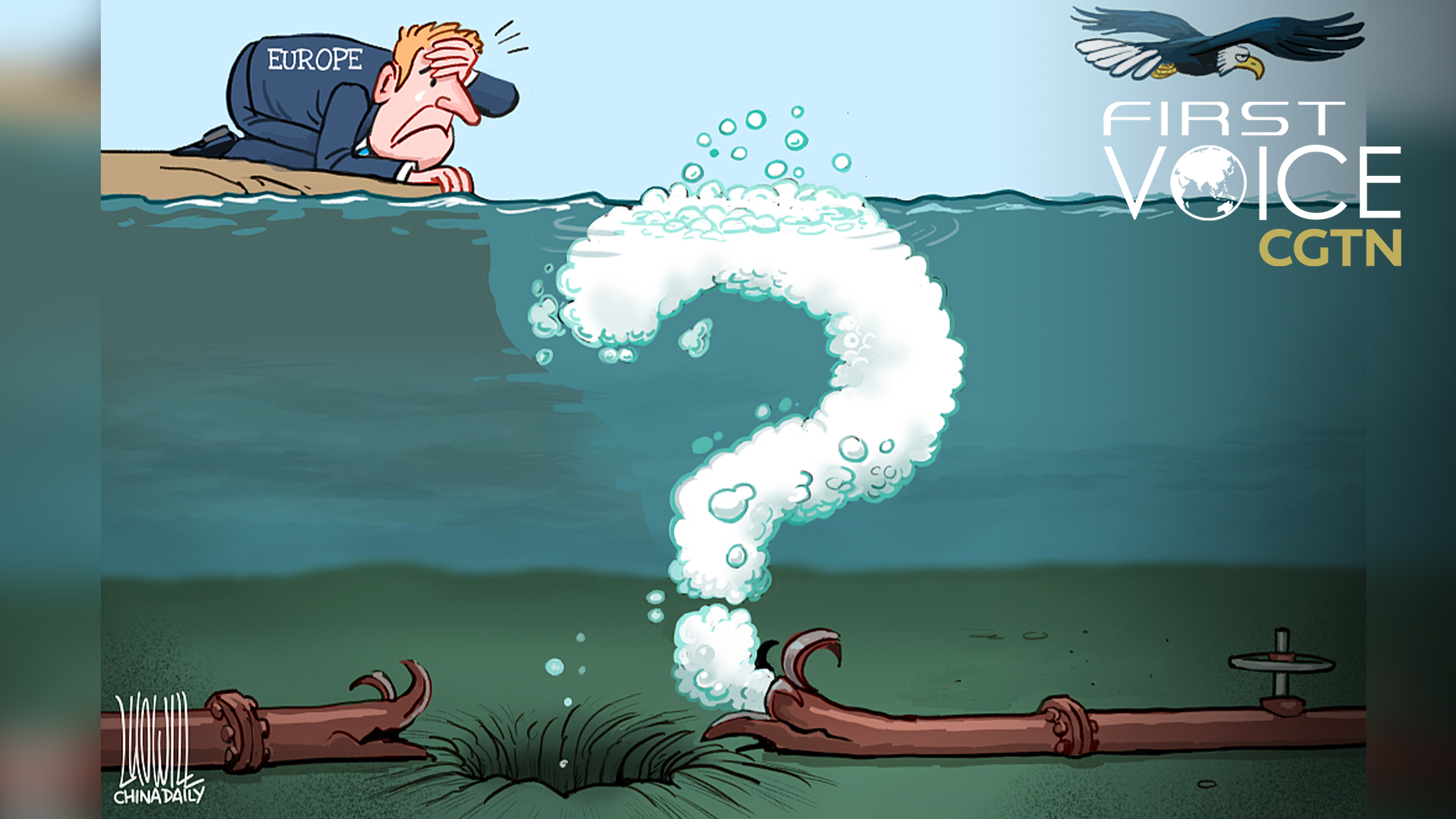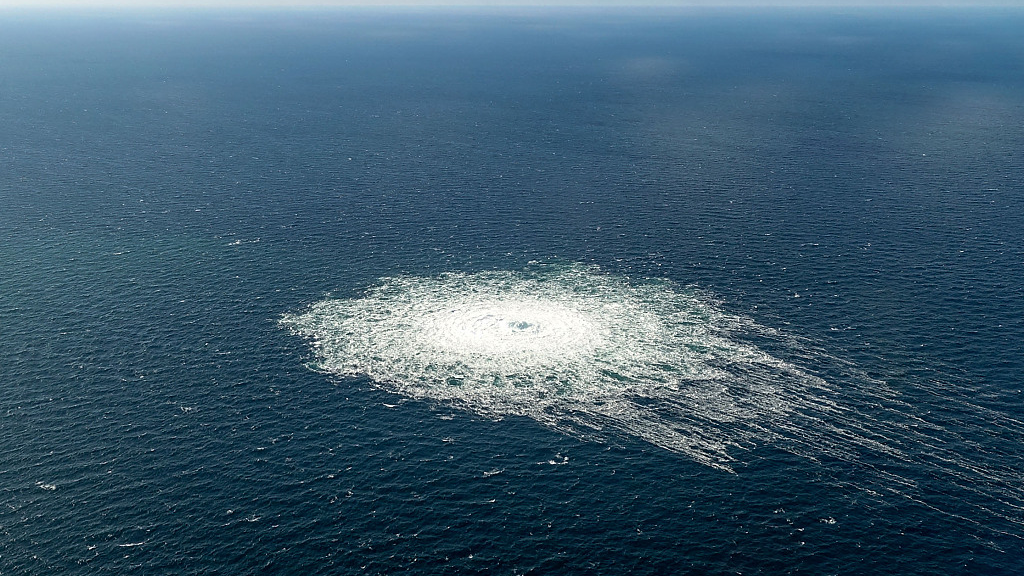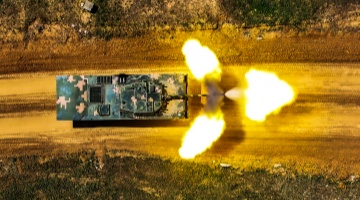
The Nord Stream gas pipeline bombings add to Europe's dilemma. /China Daily
First Voice
The recent report by the New York Times claiming that a pro-Ukraine group likely attacked the Nord Stream gas pipelines last September needs to be taken with a grain of salt. The report is a feeble attempt to deflect the blame from the United States, which is itself under scanner for its role in the brazen attacks following an earlier report by independent investigative journalist Seymour Hersh.
The NYT report, published Tuesday, suggests that the alleged attackers from the pro-Ukraine group likely comprised of Ukrainians or Russians, but the report also comes with a disclaimer that "there are no firm conclusions."
It is quite evident that the NYT report is a political "hit job" by Washington to salvage its reputation following Hersh's investigative report that implicates the U.S. for the Nord Stream pipeline attacks. Hersh's report, published last month, alleges that the clandestine underwater bombings were ordered by the White House and carried out utilizing American and Norwegian assets.
In the current geopolitical scenario, where the U.S. is trying to save face and salvage its relations with Germany and Europe, whose interests were hit the worst by the Nord Stream pipeline bombings, the hogwash offered by the NYT is not surprising. It is an effort by the U.S. to divert public attention, avoid a proper investigation of its own role and shift blame onto others – a common tactic used by Washington to manipulate the narrative.
U.S. creates 'false flags' in 'battle of narratives'
The U.S. is known for falsifying facts to win the battle of narratives. It has a long history of using false information to justify its military interventions and to promote its interests in various parts of the world. In recent times, the U.S. has been exposed for fabricating intelligence reports to justify the invasion of Iraq and its involvement in the Syrian conflict.
The U.S. also has a long history of intervening in the energy policies of other countries to promote its interests. The Nord Stream pipelines, which run from Russia to Germany, have been a source of tension between the U.S. and Europe for years. The U.S. has been pressuring Germany to abandon the Nord Stream project and instead buy liquefied natural gas from the U.S. Washington always saw the Nord Stream project as a threat to its own energy dominance in Europe and wanted to undermine it.
The damage to the Nord Stream pipelines has been a major blow to Europe's energy security. The pipelines were attacked just as the winter season was about to begin, and Europe was already facing a shortage of natural gas. The U.S., which is not a major player in the natural gas market, benefitted from the situation as it used the opportunity to sell more gas to Europe and to weaken Russia's energy dominance.

This handout photo taken on September 27, 2022 and released by the Danish Defense Command shows the gas leak at the Nord Stream 2 gas pipeline as it is seen from the Danish Defense's F-16 rejection response off the Danish Baltic island of Bornholm, south of Dueodde. /CFP
The U.S. is also known for creating false flag operations to achieve its objectives. The attack on the Nord Stream pipelines could very well be another example of such an operation. The U.S. had the motive, the means, and the opportunity to carry out such an attack. It is also among the handful of countries with the technical expertise to carry out such a sophisticated operation.
No wonder, Germany and most of Europe are trading with caution over the NYT report. German Defense Minister Boris Pistorius said Wednesday he read the news report "with great interest" but warned against drawing hasty conclusions. German media reports, meanwhile, revealed that a Poland-based company owned by Ukrainian citizens had hired a yacht that was purportedly used by five men and a woman to carry out the pipeline attacks.
NYT report doesn't hold water
There are several reasons why the NYT report won't hold water, and why it should be viewed with skepticism.
Firstly, as previously mentioned, the NYT report itself comes with a disclaimer that "there are no firm conclusions." It offers no concrete evidence to support its claims. This lack of tangible evidence raises questions about the veracity of the report, and suggests that the NYT may be relying on hearsay rather than hard facts.
Secondly, the NYT report does not address the allegations made by Hersh that the U.S. was behind the attack on the Nord Stream pipelines. Hersh is a well-respected investigative journalist with a long track record of exposing U.S. military and intelligence operations. His reporting on the Nord Stream attack should be taken seriously, particularly given the lack of evidence provided by the NYT.
Thirdly, the geopolitical context surrounding the Nord Stream pipelines suggests that the U.S. has a clear interest in discrediting the project and promoting its own natural gas exports to Europe. By blaming a pro-Ukraine group for the attack, the U.S. can further undermine the project and push for increased exports of liquefied natural gas to Europe. It is quite likely that the NYT report may be influenced by political and economic interests.
Fourthly, the lack of a clear motive for a pro-Ukraine group to carry out such an attack further undermines the credibility of the NYT report. Ukraine itself is heavily dependent on Russian natural gas imports, and any disruption to the Nord Stream project would only harm Ukraine's own energy security. Ukraine has asserted that Kyiv was "absolutely not involved" in the blasts and has no information about what happened.
And finally, the possibility of a false flag operation cannot be ruled out. The U.S. has a history of carrying out false flag operations to achieve its objectives. It is possible that the U.S. itself was behind the attack on the Nord Stream pipelines, and is now trying to deflect blame onto others. This possibility should be thoroughly investigated, rather than dismissed out of hand.
Mired in the battle of narratives, the truth behind the attack on the Nord Stream pipelines may never be fully known, but it is important that we do not simply accept official narratives without question, and that we remain vigilant in our pursuit of the truth.









